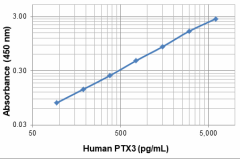- Clone
- MNB5 (See other available formats)
- Regulatory Status
- RUO
- Other Names
- PTX-3, Pentraxin 3, TSG-14, TNFAIPS, Tumor Necrosis Factor Inducible Gene 14 Protein, Tumor Necrosis Factor Alpha-Induce Protein 5, TNF Alpha-Induced Protein 5
- Isotype
- Rat IgG1, κ
- Ave. Rating
- Submit a Review
- Product Citations
- publications

-

Figure was created using pure MNB5 (Cat. NO 537902) antibody as the capture in a sandwich ELISA assay in conjunction with the biotinylated MNB4 antibody (Cat. No. 538004) as the detection antibody and recombinant Human PTX3 (ELISA Std.) (Cat. No. 786109).
| Cat # | Size | Price | Quantity Check Availability | Save | ||
|---|---|---|---|---|---|---|
| 537902 | 500 µg | 465€ | ||||
PTX3 is part of the pentraxin family which is characterized by a cyclic multimeric structure. Penatraxins are acute phase proteins that act as pattern recognition receptors. PTX3 is a long pentraxin containing a C terminal domain similar to other members of the pentraxin family and a unique N terminal domain. Inflammatory signals stimulate PTX3 production by a variety of cells including mononuclear phagocytes, dendritic cells, fibroblasts, and endothelial cells.
Serum levels of PTX3 increase rapidly in response to a variety of inflammatory and infectious conditions including endotoxic shock and sepsis. PTX3 has been proposed as an early diagnostic marker for septic shock. PTX3 can activate the classical complement pathway, aiding in pathogen recognition by macrophages and dendritic cells. PTX3 is also believed to play an important role in protection against autoimmunity by enhancing complement-mediated clearing of apoptotic cells and restricting cross presentation. Current research has also indicated that PTX3 is involved in initiating the process of tissue repair and plays a role in female fertility. PTX3 is believed to be involved in cancer-related inflammation and high PTX3 levels have been correlated with clinical stage and severity for various cancers.
Product Details
- Verified Reactivity
- Human
- Antibody Type
- Monoclonal
- Host Species
- Rat
- Immunogen
- Recombinant Human PTX3
- Formulation
- Phosphate-buffered solution, pH 7.2, containing 0.09% sodium azide.
- Preparation
- The antibody was purified by affinity chromatography.
- Concentration
- 0.5 mg/ml
- Storage & Handling
- The antibody solution should be stored undiluted between 2°C and 8°C.
- Application
-
ELISA Capture - Quality tested
- Recommended Usage
-
Each lot of this antibody is quality control tested by ELISA assay. For ELISA Capture applications, a concentration range of 2.0 - 8.0 µg/mL is recommended. To obtain a linear standard curve, serial dilutions of PTX3 recombinant protein ranging from 6000 to 93.75 pg/mL is recommended for each ELISA plate. It is recommended that the reagent be titrated for optimal performance for each application.
- Application Notes
-
The pure MNB5 (Cat. No. 537902) antibody is useful as the capture antibody in a sandwich ELISA assay, when used in conjunction with the biotinylated MNB4 antibody (Cat. No. 538004) as the detection antibody and Recombinant Human PTX3 (ELISA Std.) (Cat. No. 786109).
- RRID
-
AB_2814447 (BioLegend Cat. No. 537902)
Antigen Details
- Structure
- Homooctamer
- Distribution
-
Dendritic cells, Endothelial cells, Fibroblasts, Monocytes
- Function
- Plays roles in the regulation of innate resistance to pathogens, inflammatory reactions, possibly clearance of self-components, and female fertility.
- Cell Type
- Dendritic cells, Endothelial cells, Fibroblasts, Monocytes
- Biology Area
- Apoptosis/Tumor Suppressors/Cell Death, Innate Immunity
- Gene ID
- 5806 View all products for this Gene ID
- UniProt
- View information about PTX3 on UniProt.org
Other Formats
View All PTX3 Reagents Request Custom Conjugation| Description | Clone | Applications |
|---|---|---|
| Purified anti-human PTX3 | MNB5 | ELISA Capture |
Compare Data Across All Formats
This data display is provided for general comparisons between formats.
Your actual data may vary due to variations in samples, target cells, instruments and their settings, staining conditions, and other factors.
If you need assistance with selecting the best format contact our expert technical support team.
-
Purified anti-human PTX3

Figure was created using pure MNB5 (Cat. NO 537902) antibody...

 Login / Register
Login / Register 









Follow Us